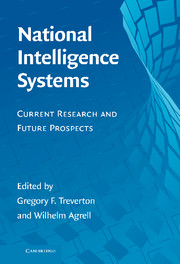Book contents
- Frontmatter
- Contents
- Preface
- 1 Introduction
- PART 1 DEFINING THE FIELD, ITS THEORY, HISTORIOGRAPHY, AND CHANGES AFTER THE COLD WAR
- PART 2 RESEARCH ON NEW CHALLENGES, METHODS, AND THREATS
- PART 3 INTELLIGENCE, POLITICS, AND OVERSIGHT
- 8 The Intelligence–Policy Maker Relationship and the Politicization of Intelligence
- 9 Oversight of Intelligence: A Comparative Approach
- 10 The Limits of Avowal: Secret Intelligence in an Age of Public Scrutiny
- 11 The Science of Intelligence: Reflections on a Field That Never Was
- Index
- References
11 - The Science of Intelligence: Reflections on a Field That Never Was
from PART 3 - INTELLIGENCE, POLITICS, AND OVERSIGHT
Published online by Cambridge University Press: 05 June 2012
- Frontmatter
- Contents
- Preface
- 1 Introduction
- PART 1 DEFINING THE FIELD, ITS THEORY, HISTORIOGRAPHY, AND CHANGES AFTER THE COLD WAR
- PART 2 RESEARCH ON NEW CHALLENGES, METHODS, AND THREATS
- PART 3 INTELLIGENCE, POLITICS, AND OVERSIGHT
- 8 The Intelligence–Policy Maker Relationship and the Politicization of Intelligence
- 9 Oversight of Intelligence: A Comparative Approach
- 10 The Limits of Avowal: Secret Intelligence in an Age of Public Scrutiny
- 11 The Science of Intelligence: Reflections on a Field That Never Was
- Index
- References
Summary
In May 1939, a young British Ph.D. in physics from Oxford, R. V. Jones, was approached by a staff member of Sir Henry Tizard's Committee for the Scientific Survey of Air Defence. Britain was, in this period, ahead of most other nations in integrating the academic scientific community and defense research and development (R&D), as illustrated by the lead that the Royal Air Force enjoyed in radar technology over the main adversary, Germany. However, as war drew closer, the Committee had experienced a problem regarding intelligence or, rather, the lack of intelligence: the British services simply were unable to collect material that might provide any insight into German efforts to apply science in aerial warfare. Jones was offered the task of looking into this problem and he accepted – by coincidence, agreeing to start his new job on September 1, the fateful day that Germany invaded Poland.
Jones's experience underscores the central theme of this book. Our purpose in surveying the state of research on intelligence is not only to suggest promising topics or even to promote better understanding by academics and others of what intelligence does – although later in the chapter we assemble some of the research suggestions that derive from the assessments of the book's chapters. Rather, our ultimate purpose is also to improve the practice of intelligence.
- Type
- Chapter
- Information
- National Intelligence SystemsCurrent Research and Future Prospects, pp. 265 - 280Publisher: Cambridge University PressPrint publication year: 2009
References
- 3
- Cited by

